Waste Management Overview
Plastic Waste Management Crisis
Conventional solutions for plastic waste management are inadequate, and globally more than 60% of the plastic waste ends up in landfills or incinerated. Dumping of plastic in landfills or incineration both show a considerable negative impact on the environment and health. Plastic & Health – The Hidden Costs of a Plastic Planet, a report published by the Center for International Environmental Law (CIEL), documented the effect of plastic at multiple stages of its life-cycle. The Plastic & Health report also reported hidden risks and knowledge gaps for the impact of plastic on the environment and health and the need for immediate actions to limit the use of plastic.
The solutions that can help limit the dumping of plastic waste include sustainable packaging such as bio-degradable, compostable, and recyclable packaging. Additionally, infrastructure development and investment in research are required for controlled plastic waste incineration and capturing the released thermal energy during energy utilization.
Developed countries that include Sweden, Germany, U.K., Australia, and France have recorded more than 90% of consumer accessibility to waste disposal. In contrast, other developed countries such as Spain, Japan, and the U.S. have recorded about 70-90% of accessibility.
Exhibit 1 illustrates the waste collection and management system in a few select countries.
Consumers Role in Overall Waste & Plastic Waste Management
Consumers are increasingly becoming aware of the global crisis of plastic waste management and demand solutions that are sustainable to overcome this crisis. However, the weakest link in the current solutions for plastic waste management is waste collection and sorting at the consumer/ customer level. Consumer access to waste dumping solutions and awareness regarding waste dumping is still negligible.
Collection of waste and consumer understanding for specific waste disposal and colors of bins are essential for successful waste collection and sorting of recyclables. In Japan and Spain, industry stakeholders such as government and product brand owners have introduced initiatives and campaigns to educate consumers to dispose of the packaging in the bins labeled as recyclables, non-combustibles, or non-recyclables. In the U.K. and U.S., waste collecting bins differ with states and counties, which commonly confuse migrating consumers and tourists, thereby resulting in reducing the rate of collecting recyclable packaging. As a result, standardization of collection bins becomes critical to attaining closed-loop sustainability through recyclable packaging.
The documented OECD reports and records indicate that the urban population in the developed countries has a standardized and streamlined waste collection and sorting systems. As a result, countries with a higher percentage of the urban population have recorded higher accessibility to municipal waste dumping by consumers and higher collection by the recycling channels.
Current Role of Government & Active Corporates to Increase Waste Collection
Both government and corporates are playing an active role in the efficient collection of recyclable and overall wastes. A few of such initiatives are listed below:
Initiatives by Government – Extended Producer Responsibility (EPR)
Developed countries have initiated implementation of Extended Producer Responsibility (EPR) policies, a strategy to hold the product manufacturers responsible for the complete life-cycle of a product that includes its reverse collection, recycling, and final disposal.
Exhibit 2 illustrates the implementation of EPR policies in select geographies.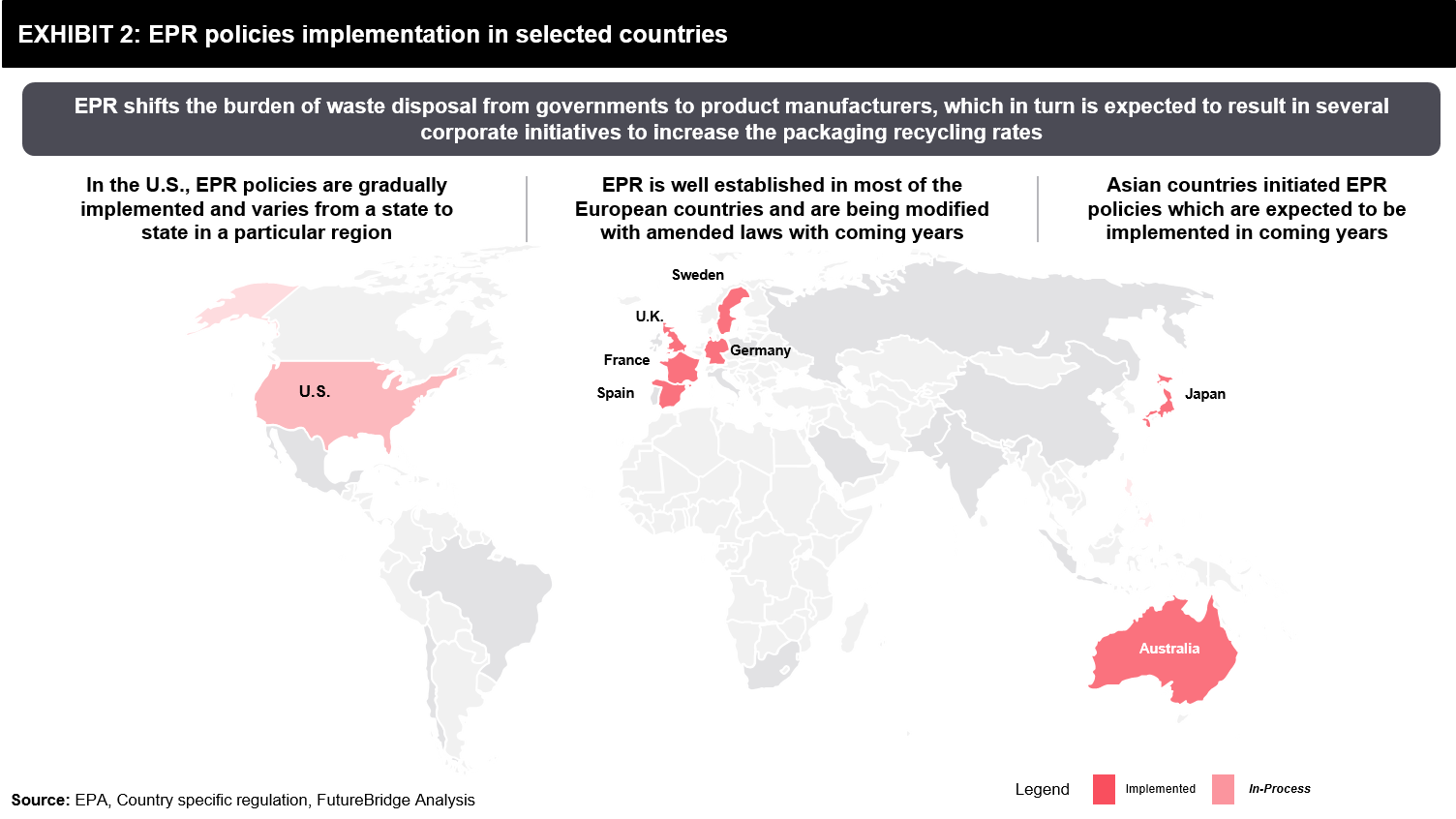
Initiatives by Corporates in the Waste Management
EPR policy covers the environmental impact cost on the product manufacturers. As a result, corporates have initiated various waste management programs that include:
- Collection of packaging waste from consumers by offering incentives and encouraging material use reduction
- Promoting recycling technologies and innovations
- Encouraging recyclers for proper recycling channels and final disposal/utilization of the recycled materials
These initiatives focus on the in-store collection of the packaging bottles/cans and incentives that have attracted consumers to return the packaging materials at the stores, thereby increasing the overall packaging recycling rates in the countries.
Examples of few of such initiatives by corporates are listed below:
Sainsbury’s
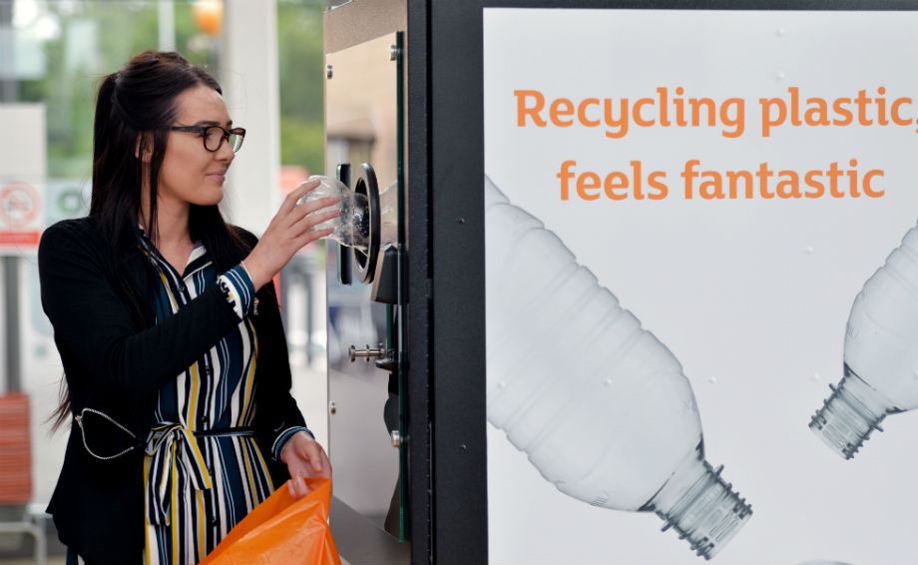 Sainsbury’s launched a Reverse Vending Recycling trial at its Lincoln Superstore, U.K., allowing consumers to return plastic bottles up to 3 liters size and drinks cans bought from Sainsbury’s in exchange for 5p coupons of their shop. Director of Sainsbury’s Brand, Judith Batchelar, quoted, “We’re delighted to offer a new way to help our customers recycle while saving on their shop.”
Sainsbury’s launched a Reverse Vending Recycling trial at its Lincoln Superstore, U.K., allowing consumers to return plastic bottles up to 3 liters size and drinks cans bought from Sainsbury’s in exchange for 5p coupons of their shop. Director of Sainsbury’s Brand, Judith Batchelar, quoted, “We’re delighted to offer a new way to help our customers recycle while saving on their shop.”
The details of the initiative are:
- Runs initiatives to help customers reduce, reuse, and recycle that include:
- Use of new airtight food cartons with 85% less plastic
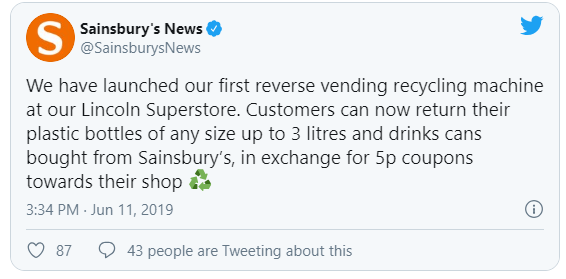 Offer incentives to consumers to return the plastic bottles/metals
Offer incentives to consumers to return the plastic bottles/metals- Introduced “Reverse vending machine,’ in specific stores that pays a 5p coupon for every plastic bottle and metal inserted by the consumers. However, the payment will be for the return of packaging for the products bought from / available in Sainsbury’s
Iceland
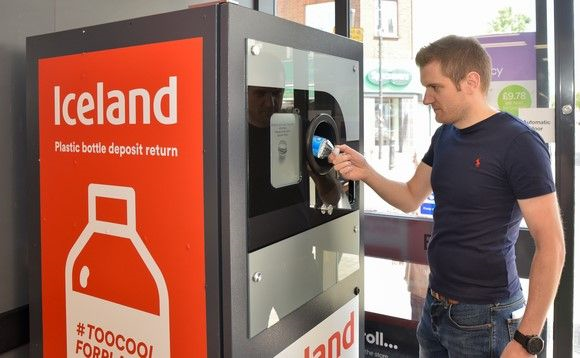 Iceland was the first supermarket in the U.K. to install a reverse vending machine in its stores for plastic recycling. Richard Walker, Managing Director at Iceland, quoted, “The results from our reverse vending machine trials highlight the growing demand from consumers to have a deposit return scheme introduced across the U.K… With over one million bottles returned to just five of stores, the positive environmental impact of having machines across the U.K. would be phenomenal.“
Iceland was the first supermarket in the U.K. to install a reverse vending machine in its stores for plastic recycling. Richard Walker, Managing Director at Iceland, quoted, “The results from our reverse vending machine trials highlight the growing demand from consumers to have a deposit return scheme introduced across the U.K… With over one million bottles returned to just five of stores, the positive environmental impact of having machines across the U.K. would be phenomenal.“
- Introduced incentive initiative using Iceland recycling machines
- Additional details regarding the initiatives are as follows:
- Machines available at five branches – Wolverhampton, Mold, Fulham, Musselburgh, and Deeside
- £10 voucher offered for the return of every bottle purchased from Iceland, only
- The initiative helped recycle an average of 2,583 bottles recycled per day
Tesco
Tesco collected about 100,000 plastic bottles through an in-store recycling trail initiative. The company’s Quality Director, Sarah Bradbury, quoted, “We’re committed to making sure all our packaging is recyclable as we look at new ways to make recycling simpler for customers. Trialing reverse vending machines is one part of our efforts. It’s one of the many ways we’re helping to close the recycling loop and prevent plastic packaging from going to waste.”
Following are the details of initiatives by Tesco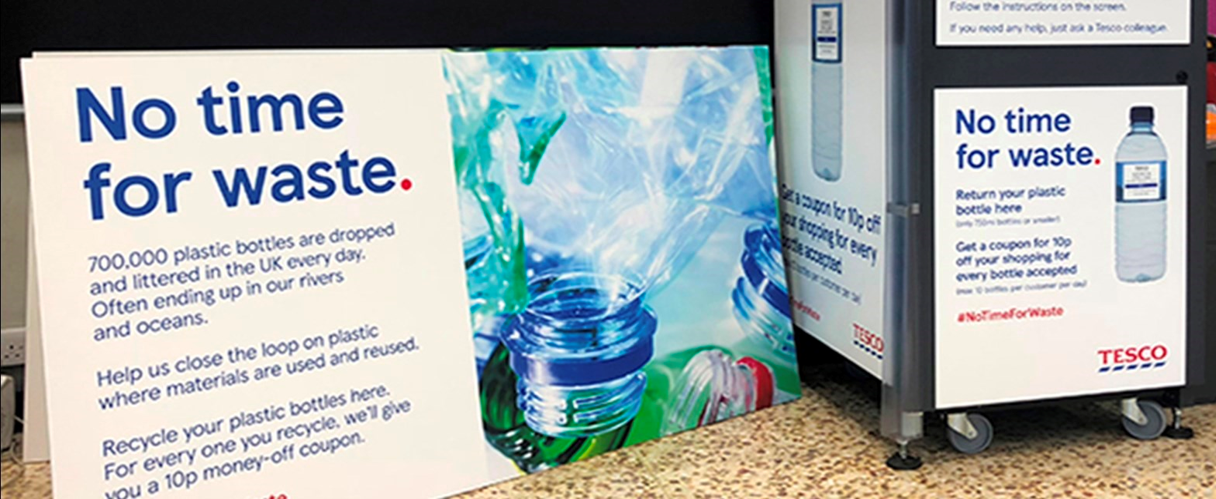
- Introduced in five Tesco stores: Borehamwood, Swansea, Edinburgh, Manchester, and Birmingham since Sep 2019, the bottle return scheme allows consumers to recycle plastic bottles for 10p to £1 per pop-up. The ‘reverse vending machines’ allow consumers to return bottles of up to 750ml
- Additionally, Tesco offers Clubcard points to customers for recycling empty ink cartridges and offer 25-125 points per cartridge. Consumers can mail the cartridges in a Freepost envelope for in-store or online pick-up
- Tesco, with its 700 stores, also allows consumers to bring their containers in an attempt to reduce the use of plastic
Valpak and Corporate Caf éChains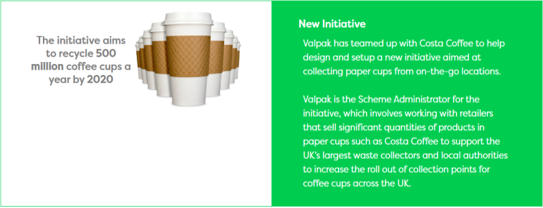
- Recently, Costa Coffee joined with Valpak in its initiative “National paper cup recycling scheme” to prevent coffee cups from ending into landfills or the incinerators in the U.K.
- The Valpak scheme is co-funded by other major brands such as McDonald’s, Café Nero, Pret, Greggs, and Burger King for the recycling cup schemes
Simply Cups & 7-Eleven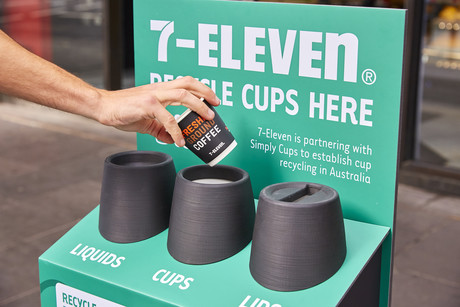
- Simply Cups initiated a program that helps the organizations/associations or any of their partners t recycle coffee cups in Australia & the U.K.
- In 2018, 7-Eleven partnered with Simply Cups and launched a recycling revolution to rescue 70 million takeaway cups from landfill
- They have successfully collected more than 1.6 million cups through 7-Eleven recycling units
These initiatives by government and corporates are resulting in increasing awareness among consumers, along with an increased rate of recyclable packaging collection. However, these initiatives are still in the initial stages, and their penetration in other parts of the world is critical.
Potential Next Steps for Efficient Management of Recyclable Packaging
Recycling packaging is the market need, and creating awareness regarding waste management among consumers is of utmost importance. The government and active corporates are taking measures to increase awareness among the consumers by introducing various schemes, initiatives, and incentives.
The bottle collection scheme with incentives has considerably increased awareness among the specified areas. However, these initiatives are confined to urban cities with access to corporate chains. Reports from EPA and marine experts from different countries indicate that recyclable packaging in rural areas end-up in landfills/incinerators due to a lack of proper waste collection and disposal systems.
Hence, it is essential to address the following listed critical facets of the waste management system to accelerate the rate of recycled packaging waste collection:
- By Government
- Increasing consumer awareness related to waste disposal and bin colors to increase the rate of collecting recyclable packaging
- Standardizing the waste collection bins colors, which will help to reduce the confusion among the migrating consumers and tourists and abate the volume of recyclable packaging that ends up in the landfills and incineration
- Standardizing waste disposal measures in urban areas
- Increasing measures for waste collection and disposal in rural areas
- By Corporate
- Extending the recycled Bottle Collection scheme in other geographies
- Creating awareness among consumers on waste disposal
- Enhancing the investment to improve recycling channels
- Investment to develop recyclable packaging innovations
References
- Plastic Waste Management: Current Status and Weaknesses
- EPA
- Coloured Plastic Bags for Kerbside Collection of Waste from Households—To Improve Waste Recycling
- OECD – Plastic Management
- Expert Opinion Publications
- Packaging Press Releases and Articles
- WHO
Need a thought partner?
Share your focus area or question to engage with our Analysts through the Business Objectives service.
Submit My Business ObjectiveOur Clients
Our long-standing clients include some of the worlds leading brands and forward-thinking corporations.
- © 2021 Cheers Interactive (India) Private Limited. All rights reserved. FutureBridge ® is a registered trademark of Cheers Interactive (India) Private Limited.




































